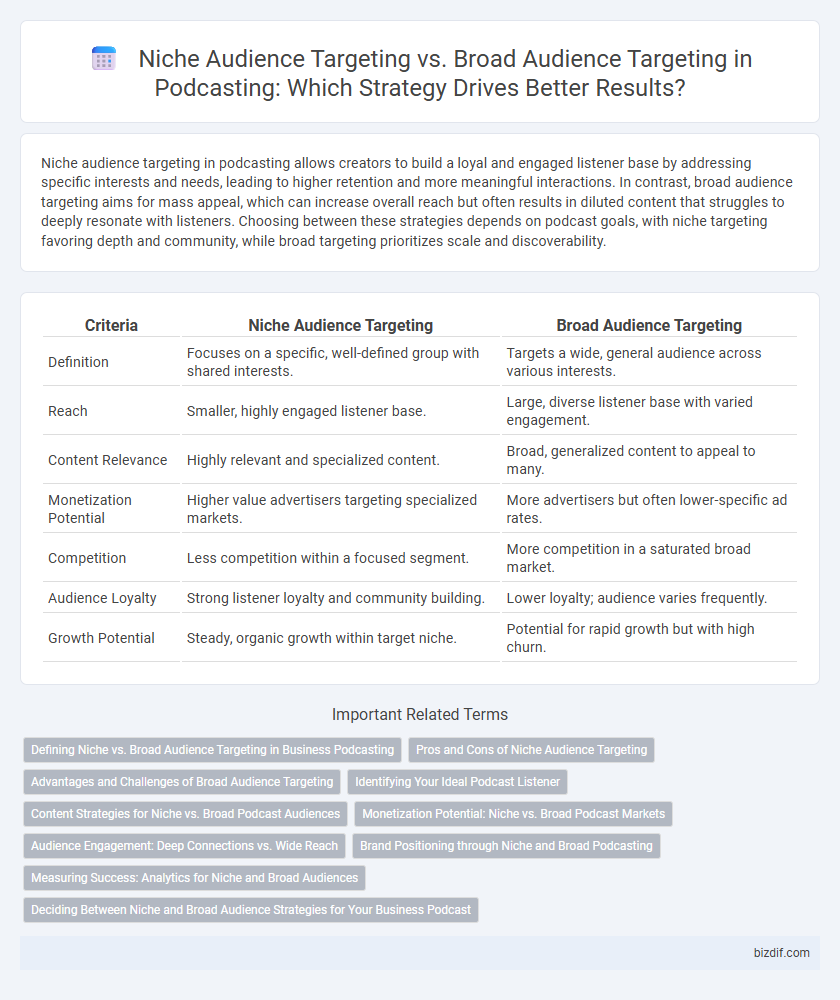Niche audience targeting in podcasting allows creators to build a loyal and engaged listener base by addressing specific interests and needs, leading to higher retention and more meaningful interactions. In contrast, broad audience targeting aims for mass appeal, which can increase overall reach but often results in diluted content that struggles to deeply resonate with listeners. Choosing between these strategies depends on podcast goals, with niche targeting favoring depth and community, while broad targeting prioritizes scale and discoverability.
Table of Comparison
| Criteria | Niche Audience Targeting | Broad Audience Targeting |
|---|---|---|
| Definition | Focuses on a specific, well-defined group with shared interests. | Targets a wide, general audience across various interests. |
| Reach | Smaller, highly engaged listener base. | Large, diverse listener base with varied engagement. |
| Content Relevance | Highly relevant and specialized content. | Broad, generalized content to appeal to many. |
| Monetization Potential | Higher value advertisers targeting specialized markets. | More advertisers but often lower-specific ad rates. |
| Competition | Less competition within a focused segment. | More competition in a saturated broad market. |
| Audience Loyalty | Strong listener loyalty and community building. | Lower loyalty; audience varies frequently. |
| Growth Potential | Steady, organic growth within target niche. | Potential for rapid growth but with high churn. |
Defining Niche vs. Broad Audience Targeting in Business Podcasting
Niche audience targeting in business podcasting focuses on delivering highly specialized content tailored to a specific group with shared interests, enhancing listener engagement and loyalty. Broad audience targeting aims to reach a wide range of listeners by covering general topics, increasing overall reach but potentially diluting message relevance. Effective podcast strategies balance content depth and scope to maximize impact within targeted market segments.
Pros and Cons of Niche Audience Targeting
Niche audience targeting in podcasting enhances listener loyalty by addressing specific interests, leading to higher engagement and stronger community building. This approach often results in better monetization opportunities through targeted advertising and sponsorships, although it may limit overall audience size and growth potential compared to broad targeting. However, focusing on a well-defined niche reduces competition and allows creators to establish authority and trust within their chosen topic.
Advantages and Challenges of Broad Audience Targeting
Broad audience targeting in podcasting offers the advantage of reaching a larger, more diverse listener base, which can increase overall downloads and attract more advertisers. Challenges include difficulty maintaining content relevance for all segments, risking lower engagement and listener retention. Broad targeting often requires versatile topics and high production quality to appeal across varied interests while managing increased competition.
Identifying Your Ideal Podcast Listener
Identifying your ideal podcast listener involves analyzing demographic data, listener behaviors, and content preferences to tailor episodes that resonate deeply with a specific niche audience. Niche audience targeting increases engagement and loyalty by addressing specialized interests, while broad audience targeting aims for wider reach but may dilute content relevance. Effective podcast growth strategies prioritize understanding listener personas to optimize topic selection, marketing efforts, and advertiser alignment.
Content Strategies for Niche vs. Broad Podcast Audiences
Niche audience targeting in podcasting emphasizes creating highly specialized content that addresses specific interests, which fosters deeper listener engagement and loyalty. Broad audience targeting requires diverse content strategies that appeal to a wide demographic, prioritizing variety and broader market trends to maximize reach and downloads. Tailoring podcast topics, language, and marketing efforts according to audience scope enhances listener retention and advertising effectiveness.
Monetization Potential: Niche vs. Broad Podcast Markets
Niche audience targeting in podcasting often drives higher monetization potential through specialized sponsorships and premium content tailored to specific interests, leading to stronger listener loyalty and engagement. Broad audience targeting generates higher overall listener numbers, which appeals to advertisers seeking mass market exposure but can dilute personalized ad relevance and decrease CPM rates. Effective monetization strategies balance audience specificity with scale, optimizing ad revenue based on podcast category, audience demographics, and advertiser demand trends.
Audience Engagement: Deep Connections vs. Wide Reach
Niche audience targeting in podcasting fosters deep engagement by appealing to specific interests, resulting in loyal listeners and higher interaction rates. Broad audience targeting achieves a wide reach but often sacrifices the intensity of connection, producing more casual engagement. Choosing between the two depends on whether the podcast prioritizes meaningful listener relationships or expansive market presence.
Brand Positioning through Niche and Broad Podcasting
Niche audience targeting in podcasting enhances brand positioning by delivering specialized content that resonates deeply with a specific listener segment, fostering loyalty and authority within that community. Broad audience targeting expands reach and brand visibility by appealing to diverse demographics, which can drive higher overall listenership but may dilute message specificity. Strategic brand positioning balances these approaches to maximize engagement, leveraging niche focus for credibility and broad appeal for market penetration.
Measuring Success: Analytics for Niche and Broad Audiences
Measuring success in podcasting varies between niche and broad audience targeting through specific analytics metrics. Niche audience targeting relies on detailed listener engagement, listener retention rates, and subscriber growth within specialized demographics to optimize content relevance. Broad audience targeting emphasizes total downloads, reach, and demographic diversity to assess overall market penetration and brand awareness.
Deciding Between Niche and Broad Audience Strategies for Your Business Podcast
Choosing between niche audience targeting and broad audience targeting for your business podcast depends on your brand goals and market positioning. Niche targeting allows for deeper engagement by addressing specific interests and challenges, often leading to higher listener loyalty and better conversion rates. Broad audience strategies aim to maximize reach and awareness, but may dilute messaging and require more diverse content to maintain broad appeal.
Niche Audience Targeting vs Broad Audience Targeting Infographic

 bizdif.com
bizdif.com